Internet Safety
Social media
Do you know ALL of your online followers?
Do you know who has access to ALL your personal details
Do you know if your account settings are all on private?
Below is an overview of the most commonly used apps
Instagram 
Instagram has become one of the biggest social networking apps used across the world, with 1 billion people using Instagram each month. Pictures and videos are posted within seconds, but do we stop for a second and think who may be able to view these pictures and videos? It can be easy to continue to use social media without thinking about safety or privacy. This article is here to help and encourage users to switch on their privacy settings and have control over who can view your information and posts.
Do you ever post a picture and hope to get lots of ‘likes’? or hope to have lots of followers, you’re not alone in feeling like this however it can become unhealthy to constantly worry about how many ‘likes’ we receive and may even feel like a competition at times with others; the more likes and followers you have the more popular you are- but can you really say you know and trust ALL your followers or feel completely safe?
When you post a picture on Instagram they then ‘own’ this picture and can do with it what they wish- sounds quite final right? This is why you should always be aware and think twice about what you are posting. Is the picture you are posting a picture that you would happily send to your parents/grandparents?
Snapchat 
Snapchat is also a popular messaging app used globally and especially popular with younger generations. As you probably know you can send pictures and videos to friends, which vanish after they’ve been viewed; however, this can be changed so that they vanish after 24 hours. Snapchat asks for your permission to access your address book but also suggest adding mutual friends. People you do not know can contact you and see your location, not only friends of friends but EVERYONE can see your contacts and location.
Facebook 
Facebook is another popular social networking site used globally. Although the world of Instagram and Snapchat seemed to have taken over a little! Facebook is still used by many and anyone can get access to your personal information on Facebook also. As well as photos Facebook also has a section called ‘About’ which has personal information about you, you may have even added your location, phone number or email address in this section. If your settings are not private ANYONE can access this information and you wouldn’t want strangers to know where you live or what your mobile number is right?!

YouTube
YouTube is another social platform which has become huge, becoming a vlogger or following vloggers is now a huge trend. You can follow vloggers who help you to learn new hobbies such as baking, creating arts, crafts or music and so much more. Learning isn’t a negative, however, following vloggers or the desire to be a vlogger can create some issues. Watching videos on YouTube can become addictive, you may spend hours watching them until the early hours of the morning and time runs away with you- the lack of sleep you get may affect you mentally and physically, you may feel a lack of energy, feel de-motivated and have a lack of alertness; perhaps try and find something relaxing to do before bed such as reading a book, journaling, using a mindfulness app such as Headspace/Calm- using such apps are proven to help you fall asleep, help with alertness, concentration and motivation.
Creating your own channel can also be positive, there may be something you feel passionately about and wish to share it with the world but again it can come with some problems, it may become a central point to what you do meaning you neglect other things and other people in your life. You may become obsessed with the number of followers or subscribers you have and if this is low this may affect your mental well-being in a negative way.
Periscope 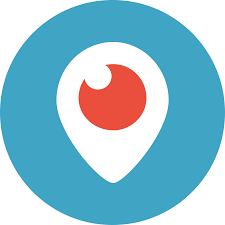
Periscope is a live streaming app which allows you to live stream from any location to anyone in the world- anyone can speak to you, follow you and if you enable location they will know where you are. Be mindful of who you are speaking to and sharing information with.
Click on each example app listed below to view how to use privacy settings.

The privacy settings on Instagram are simple- Under Account, you will have the option to make your profile private- swipe the little button across so it is BLUE and all that is shared will be private. ANYONE will be able to see what you post along with your personal details if you do not have a private account.
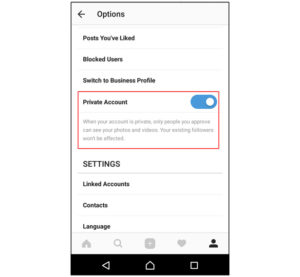

Make sure only friends can see your location and contact you- if it is on ‘Everyone’ change this by clicking on Settings and changing the options to ‘My friends’. We encourage you to only add people you know as adding strangers can put you at great risk as your location can be tracked down.
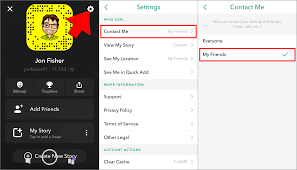

Under Privacy settings and tools and ‘who can see my future posts’ choose the option ‘Friends’ this is the best option to ensure that your personal information is not accessible to everyone.
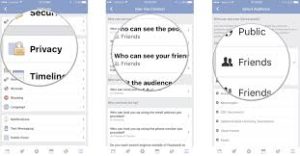
Online Grooming- what is it and what are the risks?
Online grooming is when someone uses the internet to trick, force or pressure a young person into doing something sexual – like sending a naked video or image of themselves. This is wrong. They will often build an emotional connection first, perhaps tell you things you want to hear, compliment you, send gifts even; building this connection can be a way of trapping you.
Once building this emotional connection they may:
- Try to have sexual conversations online or by text message
- Ask you to send naked pictures of yourself or inappropriate images
- Ask you to send sexual videos of yourself
- Encourage you to meet up with them in person.
Once these images are sent- it’s too late and there is no going back. They may share these images with others and once they have them they may ask for you to do more, bribe you to send more images and do things you feel uncomfortable doing. Staying connected with friends and family online is a great way of keeping in touch, however, it is really important to be aware of the risks associated with befriending or talking to people you do not know.
Signs to be aware of:
- May send lots of messages, through various social media networks
- Try to find out more about you- such as who lives with you, are you alone when speaking online?
- Send inappropriate/sexual images
- Tell you to keep conversations secret
- Try and blackmail you
- Ask you for inappropriate/sexual images
Help and Support
It’s not easy to know if someone is trying to groom you, but no matter what’s happening, there is help out there and ways of preventing grooming. The CEOP website is brilliant for help and advice on this, you can also report someone by going to www.thinkuknow.co.uk scrolling down and clicking the big red button which says, ‘report abuse’. If you are unsure about something you can speak to a trusted adult and get lots of information from the thinkuknow and Childline website.
Online Gaming- what are the risks?
Online Gaming has become huge; online games can be played on consoles and computers, mobile apps and websites. Online Gaming may sometimes feel like an escape from the real world but sometimes it can come with risks, including in-game bullying, online grooming, and even addiction. If you play online with strangers this can be a huge risk in itself. It is important to keep personal information personal! Never go and meet anyone alone, always go with a trusted adult. Also, ensure you feel safe when playing online if at any point you feel uncomfortable or are being sent harmful or hurtful messages then ensure to block this person. The very sad story of Breck Bednar is an example of how online gaming can lead to something a lot more serious.
Tips To Help Stay Safe when Online Gaming:
- Never give personal information to anyone you do not know or fully trust- such as an address or details about your family.
- Try and play online with people you know and trust!
- Never meet anyone without a trusted adult, you may feel you know them if they play online with you- however, they could easily be lying about their true identity.
- Set yourself time limits when playing games- although this may seem difficult to do it is possible! Don’t let yourself get too trapped into the world of gaming,
- Keep devices in shared family spaces so you are not isolated when playing.
- Give yourself a break! – too much screen time can be harmful so allow yourself some time away.
Help and Support
If you feel you would like further advice and support around Online Gaming or feel you need advice around a situation help and support is available from websites such as www.childline.org.uk and https://www.internetmatters.org/?s=online+gaming
Social Media and Mental Health 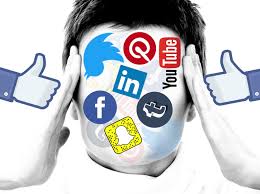
We have discussed some very important topics and ways of keeping safe when using social media apps or online gaming. Another huge part of keeping safe on the Internet involves keeping ourselves safe mentally and looking after our minds. Studies have shown that the biggest impact social media has in relation to our mental health is an impact on our sleep, using it as a life comparing tool and determining our self-worth and self-esteem by the amount of ‘likes’ we receive.
So, having said this there is clearly a huge link between our mental health and social media. Have you ever posted a picture and hoped to get lots of likes? Have you ever looked at someone else’s pictures and compared yourself to their physical appearance or their lifestyle? Have you stayed up for hours just scrolling through Instagram or Snapchat? Does any of this resonate with you? If it does, you’re not alone. 91% of 16-24-year olds use social networking, rates of anxiety and depression have increased by 70% over the past 25 years due to social media and it is continuing to be linked with low mood and anxiety; some scary fights right?!
Having said all this it’s important to recognise the benefits too. Social media can be great for staying in touch with family/friends you do not see often, sharing pictures with friends of great experiences you have had or things you have learned. You may use Instagram and Youtube to follow certain hobbies and learn new things!
The part which affects our mental health can be wishing to have numerous followers and numerous likes, constantly comparing ourselves to others and their lifestyles can have a detrimental effect on our mental well-being. If we have low self-esteem and post a picture that does not receive as many ‘likes’ as you wish this can affect the way you perceive yourself, you may feel you are not good enough. You may spend hours constantly scrolling on your phone and looking at other peoples posts, what they look like and their lifestyle and friends and again this comparison can have huge effects on your well-being, self-esteem, and confidence.
It is also important to know that the world of social media is not always the ‘real world’ someone who may seem happy, confident, popular may actually feel lonely, anxious, depressed and struggle with friendships. We only see what people want us to see meaning it may not always be a true representation of how they are feeling, so it is important to accept yourself, be happy within yourself and concentrate on the things you like about you! Something simple such as thinking about something you feel grateful for when you start your day and end your day can have a huge positive effect on your mental health.
Hints and Tips to keep your mind safe!
- Think of 3 things you like about your personality and 3 things you like about your appearance- write these on a post-it and stick it somewhere you can see everyday.
- Try and limit screen time- we all grab our phones at any opportunity and it’s easy to sit and scroll for hours but try and limit this to an allotted time- scroll for 10 minutes and then do something else.
- Think of a new hobby- something you would like to learn or something simple like going for a walk and getting some fresh air every day- this has proven benefits in relation to helping our mental well-being.
- Read a book
- Do some calming colouring!
- Use mindfulness apps such as Calm/Headspace/Sanvello – all can be downloaded from your app store!
- Create a gratitude journal and each day write one thing you feel grateful for in the day- it can be something as simple as ‘having a nice cup of tea!’- the little things go a long way!
- If you feel particularly low, anxious and are struggling always talk to someone, a friend, a family member, even a Childline counsellor. Speaking to someone and sharing the way you feel may feel difficult or scary but it will help.
All of the above are ideas to help towards positive mental health but you can think of your own ideas and ways to help you 🙂





